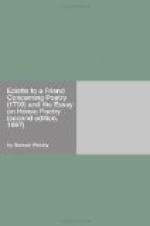The plain English of which, I think is, “That the terrible Mysteries of the Christian Faith, are not at all susceptible of these gayer Ornaments.” I’ll not be too Critical here, tho’ methinks its but an odd sort of Gayety that’s to be found in Tales of Hell; agreeable, I own, the most dreadful thing nay be, if well manag’d in Poetry, but he can hardly ever make ’em gay without a yery strong Catachresis. But tho’ we let that pass, so must not what follows, wherein he further explains his Notion. L’Evangile, &c.
The Gospel offers nothing to our Thoughts
But Penitence and Punishment for Faults.
To which it may be first said, that supposing this true, and the Gospel did present nothing else, yet why mayn’t Angels be us’d in it, to warn Sinners to that Repentance which we know they so much rejoyce in; or Devils, to punish and torment the Guilty and Impious; as in the Case of Sceva’s Son, and others. But yet further, as to the assertion it self, I know not what their Gospel offers, nor I believe are they better acquainted with what ours does; but we are sure ’tis far enough from being such a dismal melancholy thing as they represent it, since Immortality and Life are brought to light therein. We know that it gives us the noblest Examples, the most divine Law, the strongest, yet justest Passions, the most glorious Combats, and Friendships, and Sufferings, such as neither History or Fable cou’d ever yet equal. It shews us a God really Descending, disrob’d indeed of all his more dazling and insupportable Glories, as our Divine Herbert; but yet clothed with what has more of true Divinity, with Humility, and Charity, and Patience, and Meekness, and Innocence. Here’s War, here’s Love indeed; such as never was besides, or will be more. He lov’d our Dust and Clay, and even for us, single encounter’d all the Powers of Darkness, and yet more, his Almighty Father’s anger. But I’ll go no farther, lest the Reader should think I forget where I am. I must return to Boileau, whose strongest Objection is yet behind; Et de vos Fictions, &c.
And mingling Falshood with those Mysteries
Wou’d make our sacred Truths appear
like Lies.
But I hope the Critic knew, that there is a fair difference between a mere Fiction, or Falshood, and an Instructive Parable or Fable, on one side, or a few more lively Poetical Colours on the other. To mingle Falshoods, or dull Legendary Fictions, without either Life or Soul in ’em, with our Saviour’s Blessed Gospel, may make ’em, in some Sence, superiour to it: This wou’d indeed incline an Italian to be of the same Faith with his Countryman, that ’twas all Fabula Christi, in the worst Sence of the Word: But certainly expressing the Truth in Parables, and mingling these with the Mysteries of the Gospel, can’t be thought to give it an Air of Fiction: nor dare any affirm it does so, without Blasphemy, since our Saviour has so often done it. Nor only these but deeper Allegories




